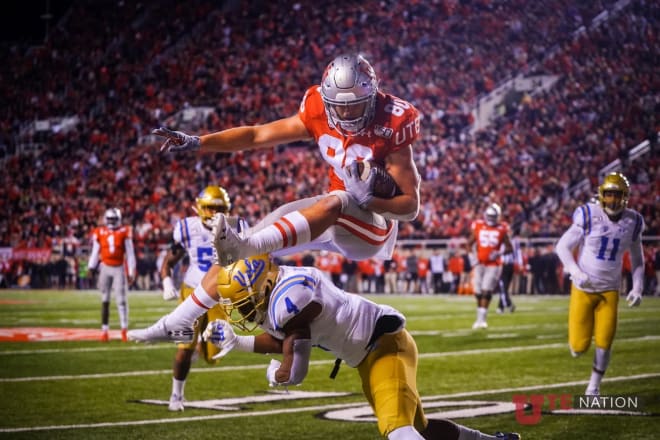Utah Football: Legacy of Building a Foundation

A great season, a historic season, and a team for the ages went down with a resounding thud on Tuesday night, in the Alamo Bowl. If you’re looking for negativity, that’s as negative as this article will go. This program and this team deserve better.
Ever since the clock struck midnight for 2020, I’ve had this thought… What if our outlook on this season was wrong? This team definitely wasn’t a team of destiny. However, what if this was the team needed to lay that final foundation for the program to get to and stay in the elite level of college football programs?
In order to understand this, let’s take a look back at history with the last 30 years.
The 1994 team was something the program hadn’t seen before, as consistent winning wasn’t part of the culture. Ron McBride’s team was led by Luther Elliss, Mike McCoy, and cast of overlooked playmakers. With a ferocious defense and a steady quarterback with a high football IQ, the 1994 squad finished in the Top 10 losing two baffling games. However, that team reintroduced a winning culture back into the program. Every team has their down years, but from that point on, simply putting up a fight during games was no longer good enough, they had to win and they had to challenge for the conference title.
The legendary bunch of 2004 wrecked NCAA football and the BCS system as we know it. It laid the next level of the foundation not just for the Utah program, but for powerful G5 programs looking for inclusion at the big boy table. Could they have beaten any and everyone? Possibly. It’s quite honestly one of the greatest “woulda shoulda coulda” arguments in modern day college football. That was a loaded team and truly a team of destiny, but that destiny wasn’t to be the best team in college football. Watch the offenses of today and you’ll see that the Alex Smith led offense under Urban Meyer, still has a lot of influence on how so many offenses are run today. This group laid the foundation for modern day offenses, as well as the inclusion of the top G5 teams.
The 2008 squad will forever be under appreciated compared to the Fiesta Bowl team, whether right or wrong. They weren’t near as dominant as the 2004 team, but they also faced tougher competition and excelled when the odds were stacked against them. As the first program to bust the BCS twice, this team laid the foundation for the Pac-12. At that point in time, many might remember that some experts believed if the Mountain West Conference shed some dead weight at the bottom of the conference and added Boise State, that the conference wouldn’t be able to be denied BCS inclusion. Thankfully that never happened and the Pac-12 came calling.
Eleven years have passed since the Sugar Bowl season. The Utes have had highs and lows, while remarkably being more consistent than Colorado—who had already been a P5 team before moving to the Pac-12.
Along the way, Kyle Whittingham had to build the Utes into a P5 program, having Pac-12 attached to their name meant that they had arrived, but it didn’t mean the road ahead to success would be easy. They had to improve their overall talent level, they had to improve their depth, they had to find an offensive identity that consistently worked, and they also had to get used to facing talented conference teams on a week-in and week-out basis.
After years of coming close to representing the Pac-12 South in the championship game, they finally broke through in 2018 with an injured and flawed team.
Everyone could sense it, 2019 seemed as though it could be special and the guys who could have left early for the draft bought in and stayed. So after climbing to as high as no. 5 in the CFP rankings, what went wrong?
Ultimately, the program needs to take the next step of winning with a target on their backs throughout the entire season. They’re too used to being and winning as the underdog—that’s what they’ve known for years.
While fans sit back and watch the CFP and New Years 6 games, Utah is noticeably absent. Not only are they noticeably absent, but they were thumped in their last two games of a once special season.
As hard as it is to grasp right now, this team has served its purpose laying an important foundation for Utah football. They’ve elevated the program to new heights, which allowed the coaching staff to get recruits that they’ve historically struck out on. They now also know what it’s like to play the entire season with a target on their backs and it was a lesson that everyone, from the coaches to the players, had to learn in an agonizing way.
When you’re seated at the big boy table, promising seasons happen less frequently, it just is what it is, unfortunately. However, the Utes' program is showing something that not many teams out west can claim: sustained success.
They’re not going anywhere, as they’re talent and depth will continue to improve. Anticipated special seasons rarely go as planned, and the Utes will likely make a trip to the Rose or CFP in a year that everyone least expects it.
The 2019 squad, loaded with NFL talent, didn’t accomplish their ultimate goal, but they laid the foundation for the program to take things to the next level. That level now, is a Pac-12 Championship or the playoffs.
Whittingham and crew aren’t going anywhere. Despite not accomplishing what they set out to accomplish in 2019, they’re now a marquee program in the west.
Welcome to the 2020 decade and welcome to the new normal of Utah football.
